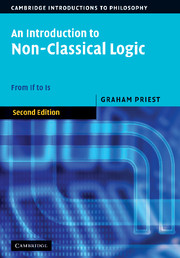Book contents
- Frontmatter
- Contents
- Preface to the First Edition
- Preface to the Second Edition
- Mathematical Prolegomenon
- Part I Propositional Logic
- 1 Classical Logic and the Material Conditional
- 2 Basic Modal Logic
- 3 Normal Modal Logics
- 4 Non-normal Modal Logics; Strict Conditionals
- 5 Conditional Logics
- 6 Intuitionist Logic
- 7 Many-valued Logics
- 8 First Degree Entailment
- 9 Logics with Gaps, Gluts and Worlds
- 10 Relevant Logics
- 11 Fuzzy Logics
- 11a Appendix: Many-valued Modal Logics
- Postscript: An Historical Perspective on Conditionals
- Part II Quantification and Identity
- Postscript: A Methodological Coda
- References
- Index of Names
- Index of Subjects
7 - Many-valued Logics
Published online by Cambridge University Press: 05 June 2012
- Frontmatter
- Contents
- Preface to the First Edition
- Preface to the Second Edition
- Mathematical Prolegomenon
- Part I Propositional Logic
- 1 Classical Logic and the Material Conditional
- 2 Basic Modal Logic
- 3 Normal Modal Logics
- 4 Non-normal Modal Logics; Strict Conditionals
- 5 Conditional Logics
- 6 Intuitionist Logic
- 7 Many-valued Logics
- 8 First Degree Entailment
- 9 Logics with Gaps, Gluts and Worlds
- 10 Relevant Logics
- 11 Fuzzy Logics
- 11a Appendix: Many-valued Modal Logics
- Postscript: An Historical Perspective on Conditionals
- Part II Quantification and Identity
- Postscript: A Methodological Coda
- References
- Index of Names
- Index of Subjects
Summary
Introduction
7.1.1 In this chapter, we leave possible-world semantics for a time, and turn to the subject of propositional many-valued logics. These are logics in which there are more than two truth values.
7.1.2 We have a look at the general structure of a many-valued logic, and some simple but important examples of many-valued logics. The treatment will be purely semantic: we do not look at tableaux for the logics, nor at any other form of proof procedure. Tableaux for some many-valued logics will emerge in the next chapter.
7.1.3 We also look at some of the philosophical issues that have motivated many-valued logics, how many-valuedness affects the issue of the conditional, and a few other noteworthy issues.
Many-valued Logic: The General Structure
7.2.1 Let us start with the general structure of a many-valued logic. To simplify things, we take, henceforth, A ≡ B to be defined as (A ⊃ B) ∧ (B ⊃ A).
7.2.2 Let C be the class of connectives of classical propositional logic {∧, ∨, ¬, ⊃}. The classical propositional calculus can be thought of as defined by the structure 〈V, D, {fc; c ∈ C}〉. V is the set of truth values {1, 0}. D is the set of designated values {1}; these are the values that are preserved in valid inferences. For every connective, c, fc is the truth function it denotes.
- Type
- Chapter
- Information
- An Introduction to Non-Classical LogicFrom If to Is, pp. 120 - 141Publisher: Cambridge University PressPrint publication year: 2008



